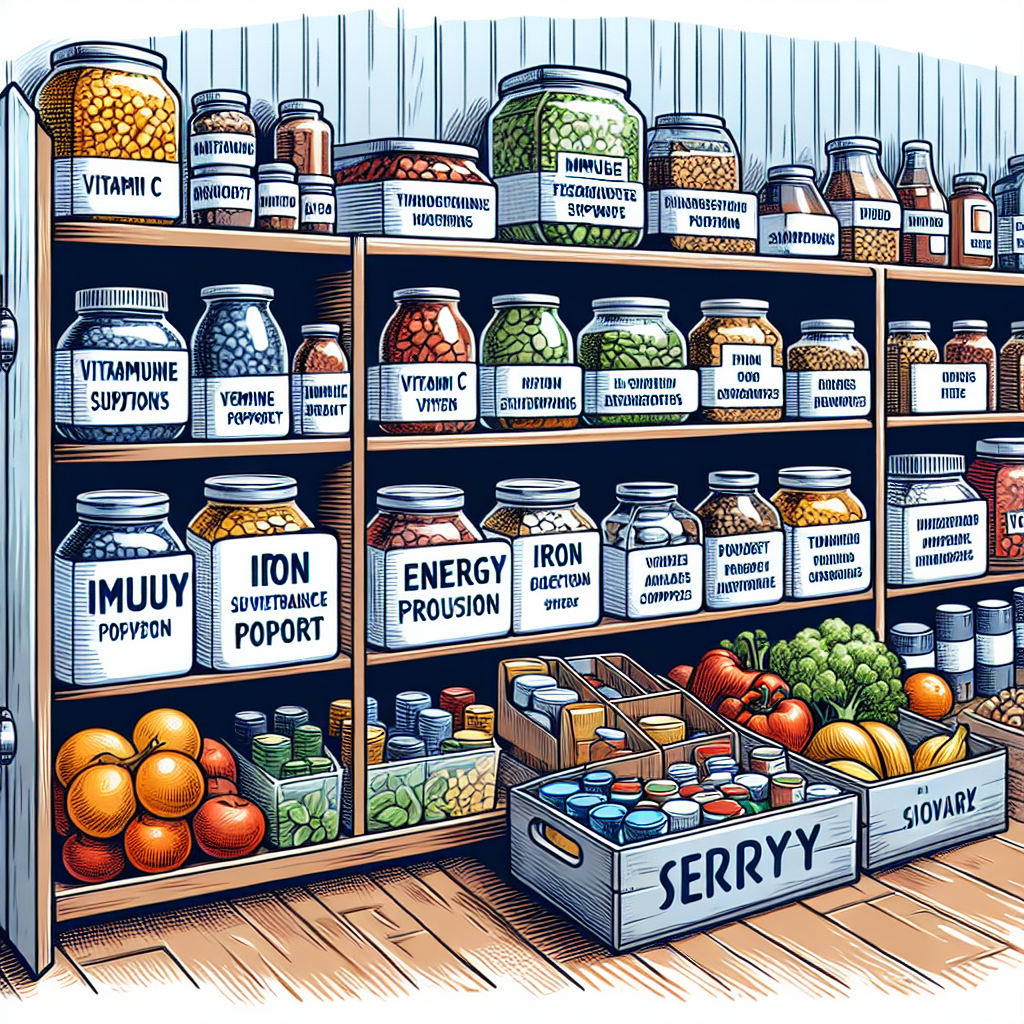In this article, we will explore the essential vitamins and minerals that every survivalist should have in their pantry. Whether you’re preparing for a natural disaster, a remote expedition, or simply looking to enhance your emergency preparedness, having a well-stocked pantry is essential. We will take a closer look at the key nutrients that can help sustain your health and provide the necessary nutrients for survival in challenging situations. So let’s dig in and discover what these vital vitamins and minerals are and how they can support your survival journey.

Protein
Protein is an essential nutrient that plays a crucial role in building and repairing tissues, as well as supporting immune function. When it comes to protein sources, both animal and plant options can provide the necessary amino acids for your body.
Animal Sources
Animal sources of protein such as meat, poultry, fish, and eggs are not only delicious but also rich in essential amino acids. These foods are highly bioavailable, meaning that your body can easily absorb and utilize the protein they contain. Lean meats like chicken and turkey are excellent options as they are low in saturated fat. Meanwhile, fish, especially fatty fish like salmon and sardines, not only provide protein but are also packed with heart-healthy omega-3 fatty acids.
Plant Sources
If you follow a vegetarian or vegan diet, you can still meet your protein needs from plant-based sources. Legumes such as beans, lentils, and chickpeas are fantastic options, as they are not only rich in protein but also packed with dietary fiber and other important nutrients. Additionally, tofu and tempeh, made from soybeans, are complete protein sources that can be incorporated into various dishes. Other plant-based protein sources include quinoa, edamame, and hemp seeds.
Carbohydrates
Carbohydrates are the body’s primary source of energy, so it’s important to include them in your survivalist pantry. When selecting carbohydrates, opt for complex carbohydrates that provide long-lasting energy and important nutrients.
Whole Grains
Whole grains, such as brown rice, quinoa, whole-wheat bread, and oats, are excellent sources of complex carbohydrates. They contain fiber, vitamins, and minerals that refined grains lack due to the removal of the bran and germ layers during processing. Including whole grains in your diet can help regulate blood sugar levels, promote digestive health, and provide sustained energy.
Legumes
Legumes, including beans, lentils, and chickpeas, not only contribute to your protein intake but also provide a good amount of carbohydrates. These versatile and affordable foods are rich in fiber, which aids in digestion and promotes a feeling of fullness. Additionally, legumes contain important vitamins and minerals such as iron, folate, and potassium.
Fats
Contrary to popular belief, not all fats are unhealthy. In fact, certain fats are essential for overall health and should be included in your survivalist pantry.
Healthy Fats
Incorporating sources of healthy fats into your diet is important for brain function, hormone production, and the absorption of fat-soluble vitamins. Foods such as avocados, nuts (like almonds and walnuts), and seeds (like chia and flaxseeds) are excellent sources of monounsaturated and polyunsaturated fats. These fats, when consumed in moderation, can help maintain heart health and reduce the risk of chronic diseases.
Cooking Oils
When it comes to cooking, it’s essential to choose oils that are stable at high temperatures to avoid the production of harmful compounds. Opt for cooking oils such as olive oil, coconut oil, and avocado oil, as they have higher smoke points compared to oils like vegetable or canola oil. These oils provide flavor and can be used for sautéing, baking, or as a salad dressing.
Vitamin C
Vitamin C is an important nutrient known for its immune-boosting properties and its role in collagen synthesis. Including vitamin C-rich foods in your survivalist pantry is crucial for maintaining good health.
Citrus Fruits
Citrus fruits, such as oranges, grapefruits, lemons, and limes, are renowned for their high vitamin C content. They not only provide a refreshing burst of flavor but also supply important antioxidants that help protect your cells from damage. These fruits can be enjoyed on their own, squeezed for juice, or used in a variety of dishes, both sweet and savory.
Bell Peppers
Bell peppers, particularly the colorful varieties like red, yellow, and orange, are excellent sources of vitamin C. These vibrant vegetables can be eaten raw in salads, added to stir-fries, or even stuffed and baked for a delicious and nutritious meal.
Leafy Greens
Leafy greens like spinach, kale, and Swiss chard are not only packed with fiber and other vital nutrients but are also fantastic sources of vitamin C. These greens can be added to smoothies, sautéed as a side dish, or used as a base for salads to increase your intake of this essential vitamin.
Vitamin A
Vitamin A is essential for maintaining healthy vision, promoting proper immune function, and supporting cell growth and development. Including vitamin A-rich foods in your survivalist pantry is highly recommended.
Carrots
Carrots are well-known for their high vitamin A content. These crunchy and vibrant vegetables can be enjoyed raw as a snack, grated into salads, or cooked in a variety of dishes. Incorporating carrots into your meals provides you with the necessary vitamin A and other beneficial nutrients.
Sweet Potatoes
Sweet potatoes are not only delicious but also an excellent source of vitamin A. These root vegetables can be baked, boiled, or mashed, and are a versatile ingredient that can be used in both sweet and savory dishes. Furthermore, sweet potatoes contain fiber and other important nutrients, making them a valuable addition to your survivalist pantry.
Spinach
Leafy greens like spinach are a powerhouse of nutrients, including vitamin A. Spinach can be enjoyed raw in salads, sautéed as a side dish, or blended into smoothies for a vitamin-packed boost. Its versatility and high nutrient content make it an ideal choice for any survivalist pantry.
Vitamin D
Vitamin D is a unique nutrient that can be synthesized by our bodies when we are exposed to sunlight. However, in certain situations, it may be beneficial to include alternative sources of vitamin D in your survivalist pantry.
Fortified Foods
Fortified foods, such as milk, orange juice, and breakfast cereals, are often enriched with vitamin D. These products can help ensure that you are meeting your daily vitamin D requirements, especially in situations where sun exposure is limited. Check the nutrition labels for information on the amount of vitamin D added.
Sun Exposure
While sunlight is the best natural source of vitamin D, it may not always be readily available. When circumstances allow, aim to spend time outdoors, preferably in the morning or late afternoon when the sun’s rays are less intense. Remember to follow sun safety guidelines, such as wearing sunscreen and protective clothing.
Vitamin E
Vitamin E is a powerful antioxidant that helps protect your cells from damage and supports immune function. Include vitamin E-rich foods in your survivalist pantry to ensure optimal health.
Nuts and Seeds
Nuts and seeds, such as almonds, sunflower seeds, and hazelnuts, are excellent sources of vitamin E. These nutrient-dense foods can be enjoyed as a snack, added to baked goods, or sprinkled over salads to elevate both taste and nutritional value.
Leafy Greens
Leafy greens, including spinach, Swiss chard, and kale, not only provide vitamin C and vitamin A but also contain vitamin E. These greens can be incorporated into a variety of dishes, such as salads, stir-fries, and smoothies, to increase your intake of this essential nutrient.
B Vitamins
B vitamins, collectively referred to as the B-complex vitamins, play a vital role in energy production, brain function, and the metabolism of macronutrients. Ensuring an adequate intake of B vitamins in your survivalist pantry is essential.
Whole Grains
Whole grains, including wheat, oats, and brown rice, are excellent sources of several B vitamins, including thiamine, riboflavin, and niacin. These grains can be used as a base for meals, made into bread or pasta, or added to soups to increase your B-vitamin intake.
Legumes
Legumes, such as lentils, chickpeas, and black beans, not only provide protein and complex carbohydrates but also contain important B vitamins. Adding more legumes to your meals, whether as the main ingredient or as a side dish, can help ensure you’re getting an adequate supply of B vitamins.
Leafy Greens
Leafy greens like spinach, kale, and Swiss chard contain a variety of B vitamins, including folate. These greens can be added to numerous dishes, such as soups, salads, and stir-fries, to increase your B-vitamin intake.
Meat and Poultry
Meat and poultry are excellent sources of several B vitamins, including vitamin B12, which is mainly found in animal products. Including lean cuts of meat and poultry in your survivalist pantry can help ensure you’re getting a sufficient amount of these essential vitamins.
Iron
Iron is a mineral that plays a crucial role in oxygen transport, energy production, and immune function. Including iron-rich foods in your survivalist pantry is vital for maintaining optimal health.
Red Meat
Red meat, such as beef and lamb, is one of the best sources of heme iron, the form of iron most easily absorbed by the body. Including lean cuts of red meat in your diet can help prevent iron deficiency and its associated symptoms, such as fatigue and weakness.
Leafy Greens
Leafy greens, including spinach, kale, and Swiss chard, also contain iron, although in a non-heme form. While non-heme iron is not as readily absorbed as heme iron, combining these greens with a source of vitamin C can enhance iron absorption. For example, squeezing lemon juice over your sautéed spinach can help increase the iron bioavailability.
Legumes
Legumes, such as lentils, beans, and chickpeas, not only provide protein and carbohydrates but are also excellent sources of iron. Incorporating more legumes into your survivalist pantry can help ensure you’re meeting your iron requirements, particularly for individuals following vegetarian or vegan diets.
Calcium
Calcium is a mineral essential for strong bones, proper nerve function, and muscle contraction. Including calcium-rich foods in your survivalist pantry is crucial for maintaining optimal bone health.
Dairy Products
Dairy products, such as milk, cheese, and yogurt, are well-known for their calcium content. Adding these products to your survivalist pantry can ensure you’re meeting your calcium needs. If you’re lactose intolerant or follow a plant-based diet, there are many non-dairy alternatives fortified with calcium, such as almond milk or soy yogurt.
Leafy Greens
Leafy greens like kale, collard greens, and bok choy provide not only vitamin K but also calcium. These greens can be enjoyed in a variety of dishes, such as salads, soups, or sautéed as a side dish, to boost your calcium intake.
Canned Fish
Canned fish with edible bones, such as salmon and sardines, are not only a great source of protein and healthy fats but also provide calcium due to the inclusion of the bones. These convenient and long-lasting pantry staples can be eaten as is or incorporated into various recipes to supply your body with this important mineral.
In conclusion, a well-stocked survivalist pantry should include a variety of nutrient-dense foods to ensure your body receives the necessary vitamins and minerals. Including protein sources from both animal and plant options, such as lean meats, legumes, and tofu, is crucial. Carbohydrates from whole grains and legumes provide sustained energy, while healthy fats from sources like avocados and cooking oils support overall health. Vitamin-rich foods, such as citrus fruits, leafy greens, and sweet potatoes, are essential for immune function and overall well-being. Finally, including iron-rich foods, calcium sources, and B vitamins from various food groups helps maintain optimal health in challenging circumstances. By investing in a well-rounded and nutrient-rich survivalist pantry, you’ll be better prepared to meet your body’s nutritional needs and thrive in any situation.
